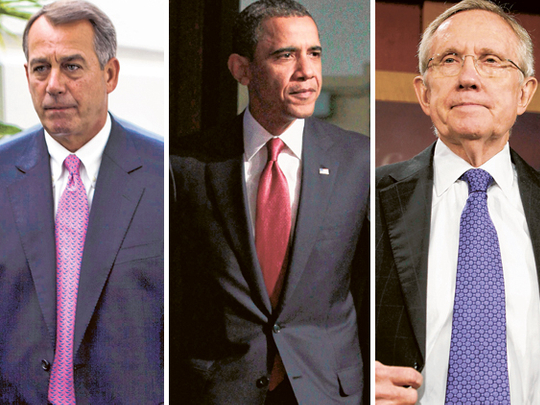
Washington: House Speaker John Boehner hastily rewrote his stalled emergency debt-limit bill yet again yesterday as Senate Democratic leader Harry Reid signalled he's ready to push ahead with his own version. President Barack Obama declared "we're almost out of time" in a wrenching political standoff that has heightened fears of a market-rattling government default.
"The power to solve this is in our hands on a day when we've been reminded how fragile the economy already is," the president said from the White House as many US stocks fell in response to a sour report on economic growth and widespread uncertainty over the Washington debt stalemate. "This is one burden we can lift ourselves. We can end it with a simple vote."
A simple vote was hard to come by, just a few days before Tuesday's debt-limit deadline.
On Capitol Hill, Reid pressed forward with his legislation, setting up a showdown vote for tomorrow. And Boehner moved to revise his measure in hopes of winning over reluctant rank-and-file conservatives who argue that the deficit cuts it contains are insufficient. The GOP leader pushed toward vote late yesterday.
Last-ditch appeal
House Republican leaders met behind closed doors with their members in a last-ditch appeal after abruptly postponing a vote that had been expected on Thursday.
Representative David Dreier of California said the revised measure would still raise the nation's debt limit by $900 billion (Dh3.3 billion) — essential to allow the government to keep paying its bills — and cut spending by $917 billion.
But a later increase in borrowing authority wouldn't take effect unless Congress sent a constitutional balanced budget amendment to the states for ratification. That was a key demand of rebellious conservatives who withheld their votes from the legislation on Thursday night.
Freshman Representative Mo Brooks said the change on the balanced-budget amendment "got a lot of additional Republican votes". At least one switcher was Representative Jeff Flake of Arizona, who said he would now back the bill.
A divided government is struggling to break the extreme Washington gridlock and head off a first-ever default that would leave the Treasury without the money necessary to pay all its bills. Administration officials say Tuesday is the deadline.
"There are plenty of ways out of this mess. But we are almost out of time," Obama said.
On the Senate floor, Reid said glumly, "This is likely our last chance to save this nation from default."
Reid said he had invited Senate Minority Leader Mitch McConnell, to join him in negotiations. "I know the Senate compromise bill Democrats have offered is not perfect in Republicans' eyes. Nor is it perfect for Democrats," Reid said. "But together, we must make it work for all of us. It is the only option."
McConnell dismissed the Democratic effort, arguing that it stands no chance in the GOP-controlled House, and he accused Obama of pushing the nation to the brink of an economic abyss.
Stinging setback
"If the president hadn't decided to blow up the bipartisan solution that members of Congress worked so hard to produce last weekend, we'd be voting to end this crisis today," McConnell said on the Senate floor.
Boehner suffered a stinging setback on Thursday when, for a second day, he had to postpone a vote on his proposal to extend the nation's borrowing authority while cutting federal spending by nearly $1 trillion. "Obviously, we didn't have the votes," Dreier said after Boehner and the GOP leadership had spent hours trying to corral the support of rebellious conservatives.
If Republicans now can get Boehner's version through the House, a rapid and complex set of choices will determine whether and how a debt crisis can be averted.
House Republicans will be under tremendous pressure to pass something, even if they have to make it so appealing to their right wing that the nation's independents and centrists will scorn it. As Thursday's events proved, nothing is guaranteed.
The main area of dispute between the two parties is how to encourage or guarantee big spending cuts in the future without rekindling a fiercely divisive debt-ceiling debate such as the one now raging.












